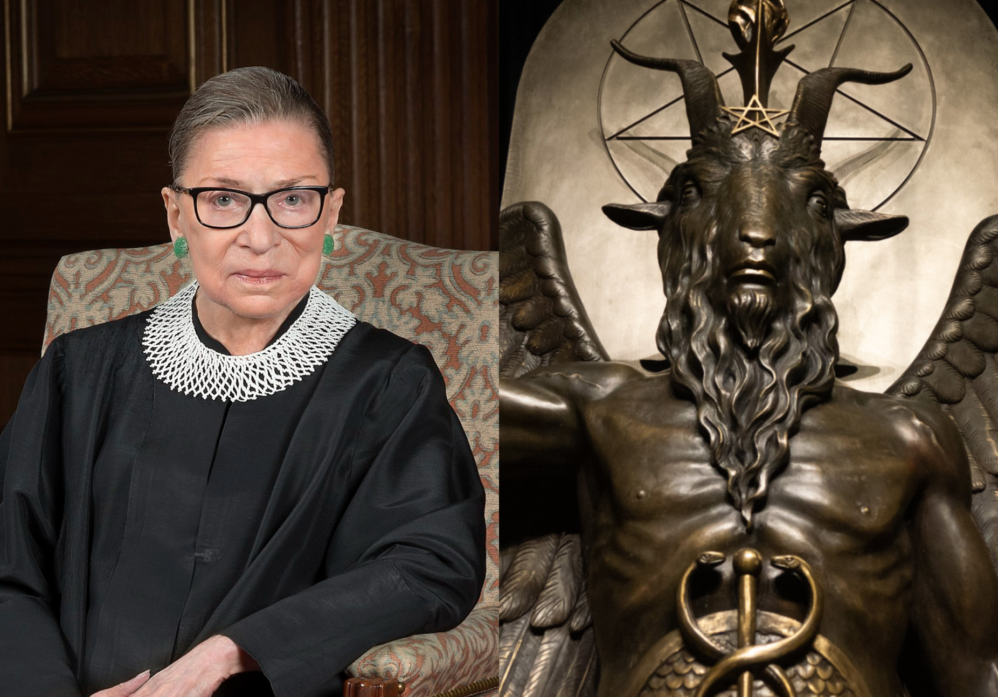Jamie Smith’s article for HuffPost Thursday had the kind of headline that was more or less guaranteed to make anyone who ran across it drop everything and click: “The Death Of Justice Ruth Bader Ginsburg Pushed Me To Join The Satanic Temple.”
“Satanic Temple” trended on Twitter, and for a bunch of MAGA influencers, it was if every one of their Christmases came at once—the Federalist even ran a piece titled “The Satanic Temple Is In Fact Emblematic Of The Leftist Worldview.” Washingtonian got Smith, an attorney who lives in the greater Washington area, on the phone to ask about why she wrote the piece and what kinds of reactions she got.
Washingtonian: So…what made you think about about writing and publishing this this piece?
Jamie Smith: I guess I’ll say some things that are maybe maybe more attorney-like than you’re looking for. But with the very real possibility that Ruth Bader Ginsburg will be replaced by an ultra conservative, I think it’s very unlikely that we will see any [Supreme Court] decisions that really promote equality and will protect women’s rights. And so as I said, in the article, even though I’ve been an admirer of the tactics of the Satanic Temple for a little while, I think their approach is brilliant. And for me, personally, and that’s why I thought this was the moment for me personally, at least to go more public with my support of what they’re doing.
How did you first became aware of the Satanic Temple and its principles that you wrote about?
I actually first became aware of them through a documentary [Hail Satan?] that came out last year. And I was fascinated with the approach they took, especially to maintaining the separation of church and state. I started paying more attention to what what what they what they’re doing, especially to protect reproductive rights. They recently came up with a reproductive rights ritual, which some of their members have used when they were seeking out abortions. And the ritual basically just involves some affirmation, repeating some of the tenets of the Satanic Temple and basically, having a woman reassure herself that she made the right choice for herself and going through with the procedure. And because the Satanic Temple is recognized as a religion under the law, it should be a religiously protected ritual. I think that’s just a brilliant strategy to use to try to safeguard reproductive rights.
It sounds like you’ve done a lot of research on them—I’m not sure if I’m asking about this the right way, but do I understand correctly that you haven’t gone to a Satanic Temple event or met with any evangelists for the Satanic Temple?
Yeah, I’m very new to it. But no, I’m not an evangelist, and I’m not a spokesperson for them. I’ve never even attended any events.
But you’re now officially a member?
Yes.
Have you met with any other members?
No, I’ve been in touch by email.
You mentioned supporting their work. Does that mean you’d be open to helping the Satanic Temple with its legal work?
Well, time permitting, I would be would be open to that.
I’m very curious what type of reactions you got after publishing this.
I had been receiving a lot of emails, earlier on in the day, yesterday when the article published, I’d say they were about 90 percent positive. Later in the day when Ben Shapiro, and other right wing pundits—I would say nuts but that’s probably not the right word—started tweeting the article, I was definitely getting a lot of emails from people who said they were praying for me or that my children would become possessed by demons and spewing a lot of anti-choice rhetoric.
Did you hear from anybody who’s become interested in joining the Satanic Temple?
Yeah, actually I heard from many people who were interested in joining. I’ve heard from a lot of people who said, at least as an initial step, they signed up for the Satanic Temple email list.
Wow, you might turn out to be the best recruiter the Satanic Temple ever had.
Possibly.
Did anything about the reaction surprise you?
I was expecting more of a negative reaction. And although in hindsight, maybe I shouldn’t have been, but I was definitely surprised that the religious right latched on to it as much as they did. Especially because I was very explicit that there is no actual devil worship.
You also brought up Unitarians.
Yeah, and I think that’s an important point to make. Because some of the criticism I got was, well, this isn’t a real religion. It’s just a set of ethical principles or guidelines. But not all religions involve belief in the supernatural. My sister was actually married by a Reconstructionist rabbi, and Reconstructionist Jews also don’t believe in supernatural or superstition, and nobody doubts that Unitarianism or Judaism is a religion. But even if others don’t agree, it is a legally recognized religion, which is an important distinction and legal strategy in bringing these cases.
What about your family and friends?
I talked to my oldest child, even before this article was published, about the Satanic Temple and why I was donating to them. I discussed the seven fundamental tenets with him. And my child said, Well, that just sounds like being a good person. I also don’t believe in really indoctrinating any child into a religion. My husband and I try to expose them to different religions, different cultures, and they can decide when they’re older, if they want to participate in any of them.
What kind of obligations do you have now that you’ve joined the Satanic Temple? Zoom meetings?
There are really no requirements. And again, I’m not a spokesperson for the Satanic Temple. For me, it means essentially doing what I have been doing, and trying to live my life in a way where I’m compassionate, and I strive for equality. And especially as an attorney, you know, I do continue to seek justice.
One thing I found surprising was I just saw before you called earlier today, the Federalist posted a video. But one thing I think there is a big misunderstanding about was how, as an attorney, I could say that justice was separate from laws. And to me that that’s almost upsetting, because throughout history we’ve seen that slavery was legal. Right now we have laws on the books that demonstrate pretty clearly that Black lives aren’t valued in this country. I would argue that all of those laws are unjust. And that especially attorneys have an obligation to ensure that the law is is changed.
This interview has been lightly edited and condensed.
Are Liberals defending Satanism? Here's how the conspiracy theory started after Ruth Bader Ginsburg's death
A woman's personal account of how she joined The Satanic Temple after the death of Supreme Court Justice Ruth Bader Ginsburg has created a lot of buzz on social media
Justice Ruth Bader Ginsburg (Getty Images)
A personal testimony of a woman on HuffPost has created quite a stir on social media. An attorney, Jamie Smith, has written a personal account of how she joined The Satanic Temple after the death of Supreme Court Justice Ruth Bader Ginsburg.
In the personal piece, she wrote: "Like so many other women in the United States, when I learned of Justice Ruth Bader Ginsburg’s passing, my first reaction was not grief but fear. I fear that American citizens are inching closer to living in a theocracy or dictatorship and that the checks meant to prevent this from happening are close to eroding beyond repair."
She further expressed that the death of Ginsburg – "one of the last guardians of common sense and decency in government" – right before the election "has put our civil and reproductive rights in danger like never before". And, this is the reason she turned to Satanism.
In the article, she clarifies that "members of the Satanic Temple do not believe in the supernatural or superstition". "They are not affiliated in any way with the Church of Satan. Instead, the Satanic Temple uses the devil as a symbol of rebellion." The Satanic Temple on their website describes their objective: "The mission of The Satanic Temple is to encourage benevolence and empathy among all people, reject tyrannical authority, advocate practical common sense, oppose injustice, and undertake noble pursuits."
Smith further pens down that the ‘Seven Fundamental Tenets’ of the Satanic Temple is something she identified with. She said, "These Seven Fundamental Tenets include that 'one should strive to act with compassion and empathy toward all creatures in accordance with reason,' that 'the struggle for justice is an ongoing and necessary pursuit that should prevail over laws and institutions,' and that 'one’s body is inviolable, subject to one’s own will alone'." These made her "realized, happily, that these were my people and that I had been a Satanist for several years without even knowing it." She wrote, "When Justice Ginsburg’s death suddenly made combating the threats to reproductive rights and a government free from religious interference more urgent, I knew it was time to join them and support their conceptual and legal battles."
She noted, "In the hours after Justice Ginsburg’s death, I sat wondering what the future would hold for my daughters. Their ability to live in a country where the religious beliefs of others would not play a role in their right to assert autonomy over their own bodies was suddenly, starkly, in danger." Smith says that’s when she "sought strength in the Satanic Temple’s efforts to turn religious arguments on their head by pushing for religious liberty for their members on an equal basis with believers in the dominant Christian faiths."
This testimony created a lot of buzz and had people weighing in on this subject. Music video director Robby Starbuck said, "Democrats are writing op-ed’s about becoming Satanists to fight pro-life Republicans now. If it wasn’t already explicitly clear to you that this is no longer about policy differences, this should really open your eyes. This is a battle of good versus evil."
3,220 people are talking about this
Another said, "Real satanism is not a debunked conspiracy theory, but historic fact. It has nothing to do w/ being a cool rebel. It's not a coincidence human sacrifice was a mainstream practice by rulers for centuries. It never stopped, only hidden & rebranded. This is what Trump is fighting." One said, "If children MUST learn about 'god' in school let's teach them about all of the gods. Norse mythology, islam, catholicism, buddhism, satanism, paganism, ect. Let them make up thier own damn minds about what they believe." One alleged, "Most liberals lean toward and actively practice satanism - They just don’t know it. Most towns and cities also have at least one Luciferian lodge where they do there 'meetings' or 'eatings' or whatever ya want to call it.”
MEA WorldWide (MEAWW) cannot independently verify and does not support any claims being made on the Internet.

The Satanic Temple Is In Fact Emblematic Of The Leftist Worldview
When justice is more important than the law and relativism receives religious freedom, the end is anarchy — and that's a serious problem indeed.
\By Kylee Zempel
SEPTEMBER 25, 2020
Ruth Bader Ginsburg, Satanism, and motherhood converged in the pages of the Huffington Post on Thursday when Jamie Smith, an attorney and mom, wrote that the death of the Supreme Court justice motivated her to join the Satanic Temple.
“I am a 40-something attorney and mother who lives in a quiet neighborhood with a yard and a garage full of scooters and soccer balls,” Smith said. “I often walk with my children to get ice cream and spend weekends hiking through a national park. I am not the type of person who would normally consider becoming a Satanist, but these are not normal times.”
When Ginsburg passed, Smith said she didn’t feel sorrow but rather fear that America is headed toward “theocracy or dictatorship,” writing:
When Justice Ginsburg died, I knew immediately that action was needed on a scale we have not seen before. Our democracy has become so fragile that the loss of one of the last guardians of common sense and decency in government less than two months before a pivotal election has put our civil and reproductive rights in danger like never before. And, so, I have turned to Satanism.
“Satanic Temple” began trending on Twitter as readers reacted to the article. Smith’s self-serious tone was met with conservatives taking the piece incredibly seriously, eager to amplify an article that confirmed the left’s fondness for the Devil himself.
This isn’t satire. This is real.
You think I’m joking when I say they’re working for the devil? https://t.co/KVuchFg9Dm
— An0maly (@LegendaryEnergy) September 25, 2020
Democrats are writing op-ed’s about becoming Satanists to fight pro-life Republicans now. If it wasn’t already explicitly clear to you that this is no longer about policy differences, this should really open your eyes.
This is a battle of good versus evil.https://t.co/8ebyk34sWb
— Robby Starbuck (@robbystarbuck) September 24, 2020
Well damn. For serving the Father of Lies this is a hell of a lot of honesty.
"The Death Of Justice Ruth Bader Ginsburg Pushed Me To Join The Satanic Temple": https://t.co/2bKMC81WVT pic.twitter.com/qcN4vifW6a
— Micah Meadowcroft (@Micaheadowcroft) September 24, 2020
Unlike what many conservatives seemed to believe, I don’t think this article was a harbinger of the left’s wholesale departure into explicit Satan worship. We should, however, analyze Smith’s argument seriously, as her claims and their implications paint a troubling picture of the dangerous ideology pervading today’s left.
Smith assured her readers that, not to be confused with the Church of Satan, the Satanic Temple doesn’t actually worship him. Most of the temple’s adherents are atheists, viewing Satan as a symbol of rebellion. According to Smith, members reject the supernatural in favor of reason.
Like other religions, Smith said, members of the Satanic Temple adopt a set of beliefs. In this case, it’s seven tenets, which include that people “should strive to act with compassion and empathy” and that “one’s body is inviolable, subject to one’s own will alone.”
“Reading through the Seven Tenets, I was struck by how closely they aligned with the unwritten code I had used to try to guide my own life for several years,” Smith wrote. “I realized, happily, that these were my people and that I had been a Satanist for several years without even knowing it.”
SERIOUSLY: Liberal Attorney Says RBG’s Death Drove Her To Join The Satanic Temple
Satanic Temple Favors Justice Over the Law
One tenet, in particular, is notable: “The struggle for justice is an ongoing and necessary pursuit that should prevail over laws and institutions.” In other words, the law is dispensable in the pursuit of justice — a remarkable statement coming from an attorney. The ends of equity justify the means of tearing down institutions. Sound familiar?
This principle, which the Satanic Temple articulates and Smith affirms, absolves the rioters pillaging America’s cities under the guise of “social justice.” It supports illegal social programs that promote a so-called oppressed group while discriminating against another group. It exonerates election fraud by those who reason that the “fascist” must be removed from the White House by any means necessary. This idea reeks of moral relativism and guarantees lawlessness.
To adopt a tenet such as this is an interesting response to the death of a Supreme Court justice and an interesting way to cope with the fear that one’s legal rights will be infringed. If equity is greater than the law, how does the Constitution fit in? If justice “should prevail over laws and institutions,” there will be nothing left for the Supreme Court, an institution itself, to protect.
The Problem of Religious Freedom for Moral Relativism
Another major problem with Smith’s argument is that she seeks to give religious legitimacy to a group defined by relativism.
Of course, the No. 1 issue for Smith is abortion, or as she euphemistically calls it, “reproductive rights.” Without Ginsburg’s vote and voice on the court, Smith argues, “Roe v. Wade is in imminent danger of being overturned not based on legal arguments or scientific reasoning, but because of religious objections to what is a safe and necessary procedure.”
Therefore, Smith has joined the efforts of the Satanic Temple in bringing lawsuits that demand religious liberty for its members, elevating their open-ended tenets to the same level as firmly held religious beliefs.
“[N]o one should have to follow a law that violates their deeply held religious beliefs,” Smith said. “If a Christian should not have to do so based on their religion, a Satanist should not have to either. This is what equality under the law means on a fundamental level.”
She continued, “There is a real chance that the Supreme Court will be lost for a generation or more to justices appointed for their religious beliefs rather than a deep understanding of the Constitution or a desire for justice to be carried out on an impartial basis.”
Note the logical inconsistency of her arguments. Smith adheres to a set of tenets that rejects the supremacy of law but then bemoans Christians’ use of “religious objections” over “legal arguments.” She then delegitimizes religious protections, but in the same breath demands them for her cult.
These Tenets Belong to the Broader Left
Smith’s biggest problem isn’t that she’s identifying with an organization whose namesake is Satan. Her biggest problem is the complete lack of rationality and consistency in her worldview that claims to be founded on those very things, at the expense of the supernatural. The broader issue, however, is that Smith’s arguments represent the doctrine of the left.
While most leftists aren’t lining up to join the Satanic Temple explicitly, they do subscribe to its tenets. This is obvious in their push for abortion and transgender acceptance, their distaste for the Constitution, and their endorsement of protests-turned-riots.
When justice is more important than the law, and relativism receives religious freedom, the end is anarchy — and that’s a serious problem indeed.
Kylee Zempel is an assistant editor at The Federalist. Follow her on Twitter @kyleezempel.















